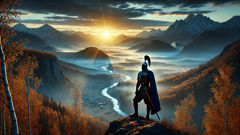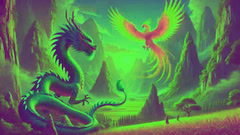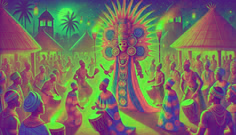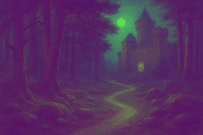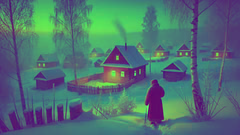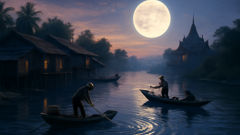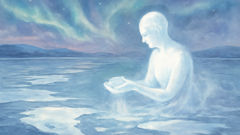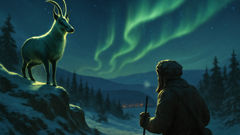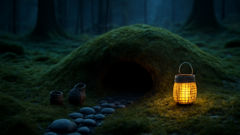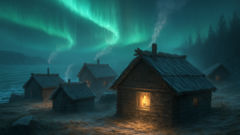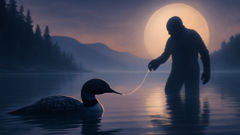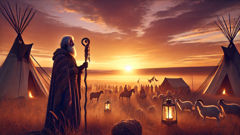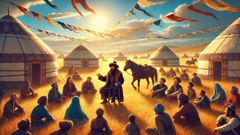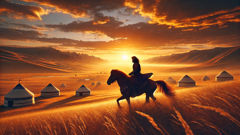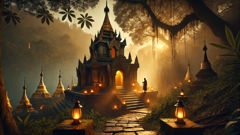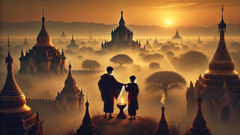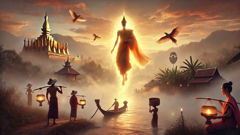Introduction
Between the folds of rock and wind where Europe’s spines meet Asia’s wide plains, the Urals cradle a story older than iron and older than winter song. In the long light of dawn, birch and pine whisper names that memory keeps: Ural, the son of a people who listen to the land, a man whose name becomes a drumbeat in the chest of his kin. This epic begins with a world both tender and perilous—villages stitched to river bends, herds turned like thought against the horizon, shamans who read the smoke, and children who learn the pattern of river stones. But danger gathers beyond pasture, in the crooked shadows where monstrously shaped beings—demons of hunger, frost, and greed—make their dens. The people of the steppe and mountain had songs for summer rain and songs for winter hunger, but no song yet told how one mortal might stand between the world and its unwinding. Ural-batyr appears as an answer given by the land itself: strong as a birch trunk, quick as a silver brook, stubborn as the bedrock beneath fields. He grows by story and by trial, learning to bend his will like a blade forged and quenched in equal parts sorrow and love. When his village is threatened and wells dry to the taste of stone, when children cough and wolves learn a new cunning, Ural's heart calls him toward a single impossible hope—the spring of life, rumored to bubble where the earth bleeds starlight and the old laws of balance are kept. This is not merely a tale of battle: it is a map of courage and a conversation with the land. It asks what a hero owes the world and what the world owes the helpless. Listen for the creak of oar and the crackle of hearth, for the low hum of a psaltery and the wind’s naming of the peaks. The story we tell will move like a horse at a hard gallop and settle like fresh snow—here are the days when Ural faced devils, forged alliances with sky and forest, and sought an impossible spring whose water could lift despair and make the dying young again.
The Birth of a Hero and the First Trials
Ural's birth carried the hush of a forest in winter. He came into the world when wolves were thin with cold and the shaman’s hut was crowded; the hearth spit and the sage-smoke curled like the footprints of ancestors. His mother named him for the mountains that had given the people shelter, his father for the river that had given strength. From the earliest steps, Ural was not content with comfort. He climbed fences and stacked logs like a child gathering promise. The elders watched him with a mix of fondness and wary awe; children in the village would follow after his shadow as if it were another sun.
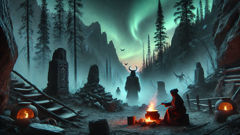
As he grew, the land taught him. Hunters taught him how to read the wind’s taste, how scent changes with height and with storm. Fishermen showed him to coax trout from pools and to listen to the river's complaint. The women taught him the rhythm of grain and song; the old men taught him to bend wood and to mark the stars. Yet not all lessons were gentle. When a blight fell upon the lambs and cold settled in riverbeds, Ural learned the instincts of a protector. He carried water when the stream's edge tightened and he bore wood when the winter piled against roofs. There is a certain education that only hardship can give: the hardening of hands, the tempering of resolve. He learned how to stand when others sank into despair.
Word of Ural's growing power and kind heart reached farther than a simple village perimeter. One mist-rain afternoon, a traveler arrived—a woman-caller with eyes like the color of stray thunder. She spoke in low verses of a mountain spring where water sang like a second voice. She claimed the spring could heal and restore but that it was watched by beings who hated the light. Her words were not for coin but for a promise: someone willing to seek the spring and face what guarded it might save more than a single hearth. The village debated: send no one and risk the slow dying of hope, or send a body and accept the danger. Ural, then no more than a man whose chest had learned to hold its breath for long minutes, stepped forward. The elders unfolded their maps of old footprints, and the shamans spoke of guardians—shapes in shadow who fed on the warmth of living things. The first trial was not yet of steel and flame but of courage: the willingness to leave what was known. Ural left with a strap of bread and a blessing carved into his palm. He walked out under a sky that looked like hammered tin, his silhouette a thin defiance against the mountain’s bulk.
The path to the unknown is a teacher of humility. Ural encountered not just the fury of occasional storm but the cold politics of the natural world: a herd diverted by snow, a valley pooled in treacherous thaw-ice, a mother bear guarding her cubs. He learned when to fight and when to soften his step. One night, under an aurora-woven sky, he found a narrow pass and a ruined altar of stone. Ancient offerings lay half-buried—bones, fluted shells, the blackened remnant of a ritual fire. Here he met the first demon not as a monstrous clash but as a negotiation. The demon’s voice was like the scrape of gravel, its form shifting like smoke; it demanded a tribute of warmth and laughter, of the last ember in a home. Ural refused with a steadiness that surprised even himself. He put down his bread, not to give it away, but to set a trap: he sang an old lullaby his mother had taught him, and the demon, unaccustomed to the small human things that carry memory, exposed a seam in its shadow. Ural struck and bound it with words and a slender rope—a victory small and quiet. He learned then that demons could be fought in more ways than with the point of a spear: with cunning, with song, with the patient application of justice. This first victory shaped him, taught him to blend the bluntness of strength with the subtler weapons of heart and mind. He continued into the mountains carrying new confidence and an ever-deepening sense that the spring of life would not be won through single battles but through a mosaic of deeds, alliances, and the steady refusal to let fear take root.
When he reached a pass crowned by a circle of black pine, Ural encountered a strange counsel: an old woman living alone who wove grass into shapes that looked like birds. She was a survivor of a clan wiped by a frost demon; her hands had the steady patience of someone who has learned to rebuild. From her Ural learned of the demons’ hierarchy: they were not mindless beasts but a cruel network; some hungered for flesh, others for song, and the darkest of them wanted the spring itself—for with that spring, they could trade immortality for dominion. The revelation sharpened his purpose. The path ahead would demand allies made of both spirit and soil: wolves that could be reasoned with, spirits of spring concealed as small blue lights, and people whose courage would light like tinder if only someone struck a spark. Ural left her dwelling with a reed flute, a promise from the widow to call down the wind if he fell, and a map inked in ash. Each of these gifts would be tested, and each would prove essential when the very idea of life and death hung in balance.
Clashes with Demons, Allies of Sky and Forest, and the Discovery of the Spring
The middle part of Ural's journey grew dense with tests that were mythic in their cruelty and intimate in their sorrow. Demons of many sorts came down from caverns and creaking rock faces. One bore the name of Hunger and appeared thin as a reed, with hands like empty baskets; another was Frost, whose breath turned tongues to glass and whose laugh unthreaded wool. Yet others crawled like overturned roots, covetous of song and memory. Ural learned the art of naming his enemy—by knowing what the demon desired, he could deny it the thing that made it powerful. He did not always triumph by force. In a valley where the demon of Silence breathed, dulling voices and swallowing song, Ural wrapped himself in a blanket and lay upon the ground, letting the silence surround him until he could hear the subtlest vibration: a beetle’s wing, a child’s pulse in sleep. He then coaxed song back into the valley by humming a rhythm that matched the beetle and amplified it until laughter returned. The demon weakened under the weight of reclaimed sound and fled into a fissure with a noise like old pots clanging. These victories were various—some were savage, some were tender—but all stitched into a larger pattern: the restoration of what demons would steal.
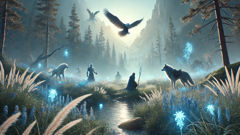
Not all help came from humans. Spirits of the land slipped into his path like wet threads. A river spirit—half deer, half water—took pity on Ural when he nearly drowned crossing a swollen stream. The spirit's antlers hummed with a music that loosened the river’s fury and gave him safe passage. In another encounter, a great northern eagle with eyes like polished amber took interest in Ural’s steadiness and began to follow from shadowed heights, bringing news of demon movements as it circled. Ural made friends with wolves as well, not by force but by respect. He saved a den from a fire started by a careless ambusher and was repaid with a wolf who would guide him across cliffs that would make ordinary feet fall. These alliances were not magic in the sense of shortcuts; rather, they were the reciprocal politics of the wild: give help and receive a debt of loyalty—not a commodity, but a living relation.
The deepest danger arose when Ural reached the valley that hid the spring of life. The valley's entrance was a mouth of black rock and white lichen, and inside the air tasted like metals and old promises. Word had always said the spring could make the dying young and could lift a village from plague; but it was guarded by Azhdak-like beings—dragons of stone and smoke whose breath fogged the mind and tempted men with memory-thorns. Ural's first view of the spring was not the glittering pool of legend but a small basin of clear water, nothing ostentatious, rimmed with pale grass and little blue flowers that closed like eyes at dusk. It was the simplicity of it that made his heart ache; the spring was what it promised: a center of balance. But the demons around it were vast and insistent. They had taken forms to make humans despair: a mother crying for lost children, a famine that wore the face of a smiling generous neighbor, a mirror that showed lovers turned to stone. Ural's trials at the spring were not purely physical. He had to resist visions that would unmake his purpose—the lure of immortality without love, the ease of ruling others to peace through terror, the temptation of letting the spring nourish only his kin. He was tempted and he stumbled, as heroes do, but always returned to the compass of his people’s need.
In the culminating clash, the demons shadowed him with a coalition of things that had once been human but were hollow now—men who had bartered their voices for steel and women whose hearts had been turned to glass. Ural fought at a scale that required him to be more than a single man. He used the flute the widow had given him; its notes braided with the river spirit's song and the eagle's cry, creating a sound that unmade the corrosive magic of the demons. The wolf-lord leapt and tore at a demon's flank while Ural struck with not only blade but with the words of naming and the weight of memory. There is a moment in legends like this when deed becomes story: when the flinch of the eye, the smell of smoke, the taste of iron and tea, all fix into a single instant that later becomes a verse. Ural reached into the basin and dipped his hands. The water was startling in its clarity—a cold like the inside of a glacier but gentled by a heat like a mother's palm. He raised it and did not drink alone. He took it back to the village and let his people taste renewal: the old woman who had once wept for her son lived to see another autumn, and a child who had a fever laughed and ran. The spring's power, as Ural had understood through his trials, was not to grant unchecked immortality but to restore balance. If given out of greed, the spring would turn generous fields into sterile salt. But given in wisdom and shared across kin and neighbor, it stitched broken threads back into a fabric that could hold. The demons could not take that which was given freely: their strength came from hoarded sorrow, from the lie that life could be the property of one clan or one being. Ural's final triumph lay not only in his martial cunning but in demonstrating that the deepest magic is the will to share what sustains life, and in that demonstration, the old guardians—who were not evil but custodians of the world's limits—bowed to his understanding. The spring remained, and its song moved from ear to ear across the Urals, a hymn that taught the people how to be keepers as well as beneficiaries of life.
Conclusion
Ural-batyr returned to his people not as a conqueror who held dominion, but as a keeper who taught stewardship. The spring's water flowed into new channels and was used with a careful sequence of rites: a little for the dying, a little for the seed, a little to nurse back the wild animals that had been harmed. Through his journeys, Ural reshaped what heroism meant for his people; he made clear that to fight was not always to slay but sometimes to listen, offer, and refuse the temptations of power. Over seasons the tale grew—a child’s lullaby, a hunter’s boast—until his name was stitched into tapestries and told again by fireside. Yet the epic never softened into mere legend; the lessons remained urgent. When drought comes or when new forms of shadow—envy, greed, indifference—rise, the story of Ural-batyr is there to remind people that balance is a practice, not a destination. The moral is not the simplicity of triumph but the humility of care: tend the spring, honor the alliances between human and wild, name the demons who try to take more than their due, and teach the next generation to stand watch. In the valley where the spring sings, children now toss pebbles and dare the echo; elders speak of days when they tasted renewed life. The mountains keep their silence and the rivers wind onward, and through the long seasons the epic endures—alive as water, patient as stone, and generous as the hands of those who refuse to hoard the light.

